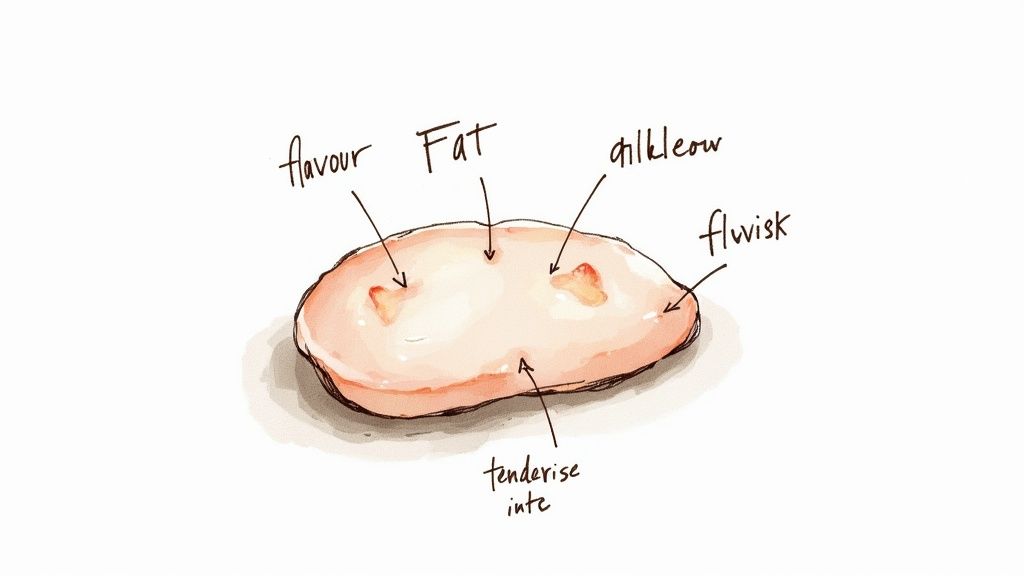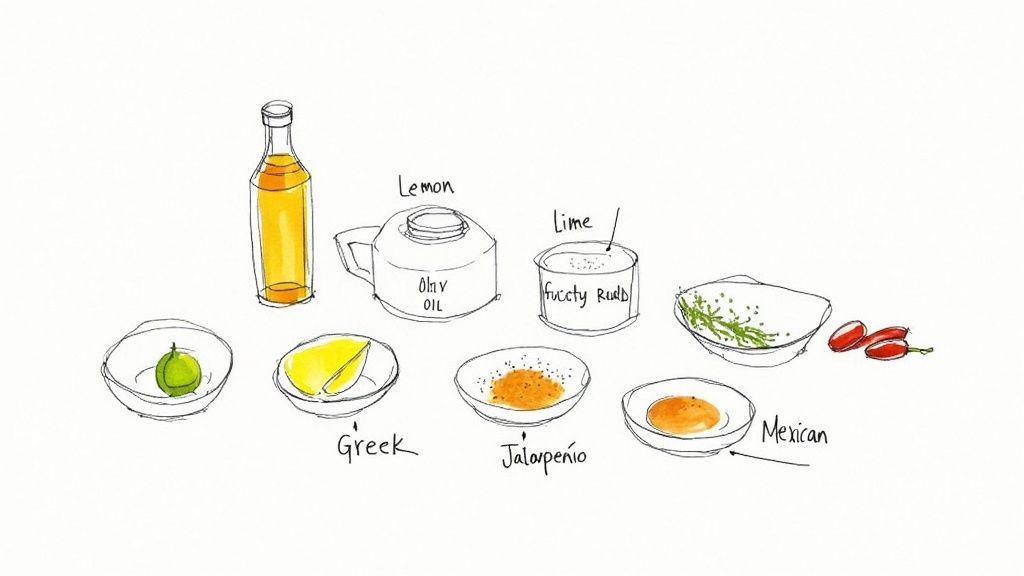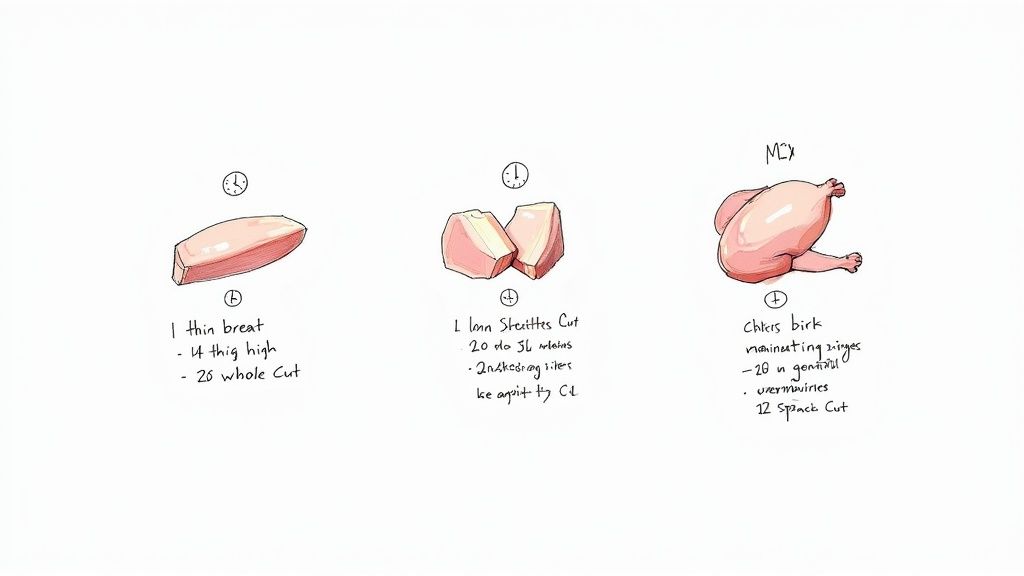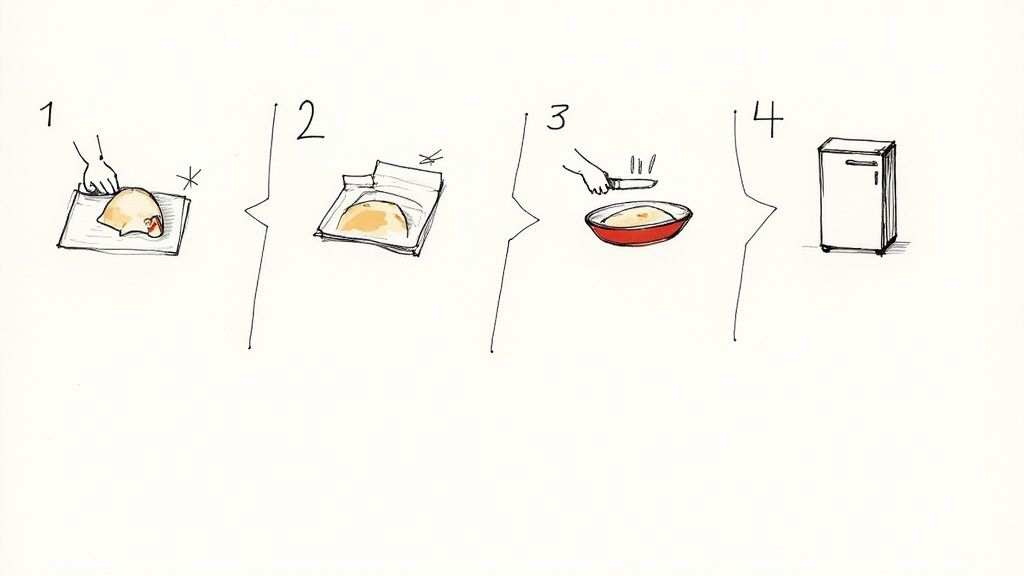How to Marinate Chicken for Ultimate Flavour
If you want to guarantee juicy, flavour-packed chicken every single time, marinating is your secret weapon. It’s a simple process: just soak your chicken in a seasoned liquid before you cook it. We're talking anywhere from 30 minutes to a few hours, depending on the cut and the marinade. This one step tenderises the meat and loads it with authentic flavour from the inside out, using only real ingredients and no added crap.
Why Marinating Chicken Changes Everything

Ever had a piece of chicken so dry and bland you needed a gallon of water to wash it down? We all have. The difference between that and a piece that’s bursting with moisture and taste isn't some fancy cooking trick—it’s the marinade.
This pre-cooking soak isn't just a surface-level coating. It gets right into the meat, transforming it on a structural level.
The Science of a Great Marinade
So, how does it all work? A good marinade has three core components working together. Once you get your head around this simple trio, you can whip up a killer marinade for any dish you can think of.
-
Acid: This is your tenderiser. Ingredients like lemon juice, vinegar, or even buttermilk start breaking down the tough muscle fibres in the chicken. It’s a process called denaturation, and it’s the first step to getting that perfect, tender texture.
-
Fat: Think olive oil, yoghurt, or sesame oil. Fat is the vehicle that carries all those fat-soluble flavours from your spices and herbs deep into the meat. It also locks in moisture while you cook, which is your best defence against dry chicken.
-
Flavour: Here’s where the fun starts. Spices, herbs, garlic, ginger—this is your chance to get creative. A proper, high-quality seasoning rub, free from cheap fillers, gives you a complex and balanced flavour base that a simple liquid can't match. Our craft can packaging keeps these real, authentic cultural flavours fresh until you're ready to use them.
It’s Not Just About Flavour
A good marinade does so much more than just add taste. By tenderising the surface, it creates a more succulent bite and helps the chicken cook more evenly. It’s the technique that elevates a standard weeknight meal into something your family or BBQ guests will actually remember.
Here in the UK, we absolutely love our chicken—it’s a staple in kitchens up and down the country. Broiler chick placings hit a massive 103.8 million in September 2023, which was an 8.8% increase from the year before. That's a lot of chicken! You can dig into the numbers yourself by checking out the latest government poultry statistics. This constant demand fuels our obsession with finding new and exciting ways to cook it, and marinating is always at the top of the list.
Building Your Perfect Chicken Marinade

This is where the real fun begins. Let’s forget about those generic, preservative-packed marinades you find in the shops and get down to crafting your own signature flavours from scratch.
Making your own marinade isn't just about getting a better taste; it’s about knowing exactly what’s going into your food. And let's be honest, that's becoming more important for all of us. People want to know where their food comes from, from cage-free eggs to ethically raised meat. So, knowing how to marinate chicken with real herbs, spices, and a sensible amount of salt is a skill that’s more relevant than ever.
The Marinade Framework
The secret to a knockout marinade is all about balance. Once you get the hang of the core components, you can whip up something amazing for any occasion, whether it’s a smoky BBQ or a fresh Mediterranean feast.
Here’s the simple formula I always come back to:
- The Flavour Base: This is your foundation. I always start with a high-quality rub. It saves you from measuring out a dozen different spices and gives you a complex, perfectly balanced starting point. Think of it as your flavour shortcut.
- The Acid Element: A splash of lemon juice, lime juice, vinegar, or even plain yoghurt does the crucial work of tenderising the chicken. Just don’t go overboard – too much acid can turn the meat mushy.
- The Fat Component: A good glug of olive oil, rapeseed oil, or sesame oil is non-negotiable. It helps carry all those delicious flavours deep into the meat and stops it from drying out on the grill.
A great marinade does so much more than just add flavour—it completely transforms the texture. That combination of a quality rub and a simple liquid base creates layers of taste you just can't get from a dry seasoning alone.
From Rub to Marinade: Practical Examples
Starting with a top-notch rub really does make all the difference. To get everything prepped and cooked properly, having some essential kitchenware on hand will make your life a whole lot easier.
Here’s how you can turn our signature blends into incredible marinades in just a few minutes:
Greek Marinade for Grilled Chicken Skewers:
- In a bowl, combine 2 tablespoons of our Greek Odyssey Gyros Rub, 3 tablespoons of olive oil, and the juice of one lemon.
- Add 500g of diced chicken thigh and mix until fully coated.
- Let it marinate for at least 2 hours before threading onto skewers and grilling.
Spicy Fajita Marinade for Weeknight Dinners:
- Grab our Holy Jalapeño Fajita Seasoning and mix 2 tablespoons with the juice of a fresh lime and 3 tablespoons of rapeseed oil.
- Toss with 500g of sliced chicken breasts.
- Marinate for 30 minutes before pan-searing with sliced peppers and onions for sizzling fajitas.
This simple framework gives you the freedom to experiment. For more ideas on what flavours work well together, check out our guide to the best BBQ rubs for chicken. Learning how to marinate chicken this way means every single dish you make will be all yours.
Mastering Marinating Times for Any Cut

When it comes to marinating chicken, timing is everything. Get it right, and you’re rewarded with succulent, flavourful meat. Get it wrong, and you can end up with a texture that’s either bland or, even worse, mushy and unpleasant.
The secret is understanding that different cuts need different amounts of time in the marinade. A thin, delicate chicken breast simply doesn’t need as long as a robust, bone-in thigh. You want to give the flavours enough time to sink in without letting any acidic ingredients go too far.
Why Marinating Too Long Is a Problem
The acid in your marinade—whether from citrus juice, vinegar, or yoghurt—is what tenderises the chicken by breaking down its proteins. This process, known as denaturation, is fantastic in small doses.
But if you leave chicken in an acidic marinade for too long, that breakdown process doesn't stop. The acid keeps working until the surface of the meat turns soft, chalky, and frankly, a bit grim. It essentially 'cooks' the outside, resulting in that dreaded mushy texture nobody wants.
With a lean chicken breast, this can happen in as little as a couple of hours if the marinade is heavy on the acid.
A Guide to Marinating Times
To avoid any mishaps, it’s best to follow a simple guide. Thinner, boneless cuts need less time, while larger, bone-in pieces can handle a much longer soak.
Here’s a quick reference to help you plan your prep perfectly.
The table below breaks down our recommended marinating times for the most common cuts of chicken. Use it as your starting point to get consistently great results every single time.
Recommended Marinating Times for Chicken Cuts
| Chicken Cut | Minimum Time | Ideal Time | Maximum Time (Acidic Marinade) | Maximum Time (Non-Acidic Marinade) |
|---|---|---|---|---|
| Whole Chicken | 4 hours | 12-24 hours | 24 hours | 48 hours |
| Boneless, Skinless Breasts | 30 mins | 2-4 hours | 6 hours | 24 hours |
| Bone-in Thighs | 2 hours | 4-12 hours | 24 hours | 48 hours |
| Chicken Wings | 30 mins | 1-4 hours | 6 hours | 24 hours |
| Chicken Drumsticks | 2 hours | 4-8 hours | 12 hours | 36 hours |
Keep in mind that these are guidelines, not rigid rules. A very potent, acidic marinade might need less time, while a gentler, oil-based one gives you much more room for error. Always trust your instincts!
If you're looking for more detailed tips on handling different cuts, especially for the smoker, our guide to cooking the perfect smoker chicken breast has some great advice.
Remember: A non-acidic, oil-and-herb-based marinade is your friend if you’re prepping well in advance. You can often leave chicken in these for up to 24 hours without any negative effects on texture. It's the acid that requires careful timing.
Putting It All Together: The Marinating Method

Right, let's get down to business. Following a consistent method is what separates good marinated chicken from a truly great one. It’s not just about chucking a few ingredients in a bowl; it's about prepping the chicken so it soaks up every last drop of flavour.
These are the simple but essential techniques that pro chefs and BBQ pitmasters swear by. Forget the theory—this is the practical stuff that delivers results, time and time again.
Prep Your Chicken Like a Pro
Before a single drop of marinade touches that chicken, you need to get the meat ready. First up, pat it completely dry with a paper towel. I know it sounds fussy, but trust me, getting rid of that surface moisture is crucial. It helps the marinade actually cling to the meat instead of sliding off.
If you're working with thicker cuts like big chicken breasts or chunky thighs, think about scoring the surface. Just make a few shallow cuts (about 1cm deep) across the top. This simple trick massively increases the surface area, letting that marinade work its way deep into the meat for a much more flavourful result. It has the added bonus of helping the chicken cook more evenly, too.
The Dry Brine Game-Changer
Here’s a technique that adds a serious layer of flavour and sets you apart from the amateurs. Before you even reach for your wet marinade, give the chicken a generous coating of a quality rub and let it sit for 15-20 minutes.
This acts as a "dry brine," seasoning the meat directly and drawing out a tiny bit of moisture to create a concentrated, super-flavourful surface. Using a bold blend like our Chipotle Cowboy Chicken Rub at this stage builds a smoky, savoury foundation that a liquid-only marinade just can't match. Once that time’s up, go ahead and pour your wet marinade right over the top.
Choosing Your Marinating Container
You've got two main options here, and honestly, both are great choices.
-
Zip-Top Bags: These are brilliant for getting total, even coverage. You can squeeze out most of the air, which keeps the marinade in constant contact with every nook and cranny of the chicken. They’re also flexible, dead easy to stash in a packed fridge, and make clean-up an absolute doddle.
-
Glass or Ceramic Dishes: A non-reactive dish is another solid bet (just avoid metal, as it can react with acidic ingredients). It’s reusable and sturdy, but you’ll need to remember to flip the chicken every so often to make sure all sides get an equal soaking.
Pro Tip: Whichever you choose, press a layer of cling film directly onto the surface of the chicken and marinade. This minimises air exposure and stops the top of the chicken from drying out, ensuring it stays fully submerged.
Keep It Cold, Keep It Covered
This is the single most important rule of marinating: always, always keep your chicken in the fridge. Leaving chicken to marinate at room temperature is a massive food safety no-no, as it’s the perfect breeding ground for nasty bacteria.
Stick your sealed bag or covered dish in the coldest part of your fridge and let it do its thing for the recommended time. Follow these steps, and you'll sidestep all the common mistakes for perfectly tender, flavour-packed chicken every single time.
Cooking Your Marinated Chicken to Perfection
https://www.youtube.com/embed/5h974fXFFHE
Right, you’ve put in the work and built up some incredible flavour—now for the final, crucial step. The cooking method you choose is what will make those hard-earned flavours truly sing. A great marinade deserves a great cooking technique to match.
It’s not just about blasting it with heat. You need to control that heat to enhance the marinade's character. Whether you're grilling, roasting, or pan-searing, each approach brings something different out of the sugars, oils, and spices you’ve used.
Managing Different Cooking Methods
Every cooking style gives you a different result. Grilling delivers that irreplaceable smoky char, roasting gives you incredibly tender meat and crispy skin, and a hot pan delivers a fantastic, caramelised crust.
-
Grilling: Marinades with sugar or a lot of oil can cause flare-ups on the BBQ. The trick is to keep one side of your grill on a lower heat. Sear the chicken over the high heat first to get some colour, then slide it over to the cooler side to cook through gently without burning. For an unbeatable smoky flavour, try a marinade built around our Hickory Hog Pork Rub.
-
Roasting: If you want crispy skin from the oven, you need to pat the chicken dry after taking it out of the marinade. A little bit of leftover oil is fine, but any excess liquid will just steam the skin instead of letting it crisp up. I like to start with high heat for the first 15 minutes to get the fat rendering, then turn it down to finish cooking.
-
Pan-Searing: Get your pan properly hot before the chicken goes anywhere near it. And don't overcrowd it! Tossing too much in at once drops the temperature and you'll end up steaming the chicken. If you need to, cook in batches to make sure every piece gets a beautiful, golden-brown crust.
The UK's poultry industry is a massive part of our national economy, contributing around £8.2 billion to the GDP in 2023. This huge sector supports over 35,000 direct jobs and often incorporates marination into its processes for ready-to-cook products, which just shows our growing demand for convenient yet flavourful meals. You can learn more about the economic impact of the poultry industry and its sheer scale.
The Golden Rule of Food Safety
Look, the single most important part of this whole process is making sure your chicken is safe to eat. Always, always use a meat thermometer and check that the internal temperature hits 74°C (165°F). This is non-negotiable.
A critical safety tip: Never, ever reuse a marinade that has had raw chicken sitting in it. If you're determined to use it as a sauce, you must bring it to a rolling boil for at least one full minute to kill any nasty bacteria. Don't skip this.
By pairing the right cooking method with your marinade and always putting food safety first, you're pretty much guaranteed a perfect result. For more in-depth grilling techniques, be sure to check out our complete guide on how to BBQ chicken.
FAQs: Your Marinating Questions Answered
We get it. Even the most seasoned cooks run into questions. Here are quick, practical answers to the most common queries about how to marinate chicken.
Can I marinate frozen chicken?
Short answer: it’s a bad idea. A marinade just can't work its magic on a solid block of frozen meat. As the chicken thaws, it also releases a ton of water. This completely dilutes your carefully crafted marinade, leaving you with bland, watery results. For maximum flavour, always thaw your chicken completely in the fridge first, then pat it dry before it goes into the good stuff.
What’s the difference between a marinade and a brine?
While they both make chicken taste better, they do two very different jobs. A brine is all about moisture. It’s a simple saltwater solution that uses osmosis to help the meat hold onto its own juices during cooking, making it incredibly succulent. A marinade is all about flavour. It’s usually a mix of acid, oil, and seasonings designed to tenderise the surface and load it with a specific taste. For a killer flavour base that works in any marinade, our SPG (Salt Pepper Garlic) Base Blend is the perfect starting point.
Why did my marinated chicken turn mushy?
This is the classic sign of over-marinating. The culprit is almost always too much acid—think citrus juice or vinegar—left for too long. Acid breaks down the proteins in the meat, which is great for tenderising. But leave it on too long, and it just keeps going, turning the texture soft, chalky, and downright unpleasant. Stick to the recommended marinating times for your cut of chicken to get meat that's tender, not texturally tragic.
Can I freeze chicken in a marinade?
Absolutely! This is a brilliant meal-prep hack. Just pop your raw chicken and marinade into a freezer-safe bag, squeeze out all the air you can, and chuck it in the freezer for up to three months. The chicken marinates perfectly as it thaws slowly in the fridge, so it’s ready to cook the moment you are. This trick works especially well with big, punchy flavours like our Miami Mojo Citrus Blend. Exploring broader strategies for reducing food waste can help prevent spoilage and save money, too.
Ready to mix up your own signature marinades? At Smokey Rebel, our small-batch, filler-free rubs give you the perfect foundation to build on. Get creative, experiment with bold tastes, and make every meal one to remember. Explore our range and find your new favourite in our build-your-own bundle today.
Join our Mailing List
Sign up and get Smokey Rebel Recipes + weekly recipes straight to your inbox!
Recent articles
The Ultimate Meal Prep Meal Guide for Flavorful Weeks
Master the art of the meal prep meal with our guide. Get easy recipes, storage tips, and discover how Smokey...
Read moreThe Perfect 40th Birthday Present for Him
Stop the search for the perfect 40th birthday present for him. Discover unique, flavour-packed BBQ rubs and gift sets he'll...
Read moreYour Guide to the Best Pellets for Grill Perfection
Unlock incredible flavour with our guide to pellets for grill. Learn to choose, use, and store wood pellets for the...
Read more


